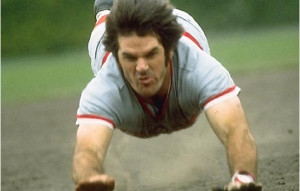Major League Baseball Commissioner Rob Manfred is a man after my own heart.
He has told Pete Rose categorically this: No matter how great you were on the field of play, you do not deserve reinstatement in the game you dominated for so many years.
It’s been speculated that Manfred’s edict might open the door — if only slightly — for Rose to be inducted into the Hall of Fame. I hope that isn’t the case, either. Most experts, though, say that Manfred’s decision slams the Hall of Fame door shut — forever.
Look, I am as big a baseball fan as any red-blooded American male. I used to love watching Rose play hardball. He got more out of his fairly limited natural athletic ability than any 10 players who ever donned a uniform. Rose played hard and he played to win.
Even in all-star games. Who can forget when he bowled catcher Ray Fosse over in the 1970 all-star game, injuring Fosse so severely that the Cleveland Indians star never recovered fully?
That said, he also violated one of MLB’s cardinal rules. He bet on the game. The rule book stipulates clearly: violation of the no-betting rule shall result in a lifetime ban from the game.
As others have noted, MLB instituted the rule as a reaction to the 1919 Chicago “Black Sox” betting scandal that has kept Shoeless Joe Jackson — another Hall of Fame-quality player — out of the Cooperstown, N.Y., shrine.
I also am acutely aware that the Hall of Fame is full of assorted scoundrels; they are drunks, racists, womanizers, drug users … you name it, they’ve done it and are still in the Hall of Fame.
The Grand Old Game doesn’t stipulate — in writing — that holding racist views or bar-hopping the night before a big game disqualifies you from having anything to do with the game.
It does with betting.
Pete Rose bet on baseball. As Manfred said, Rose “has not presented credible evidence of a reconfigured life either by an honest acceptance by him of his wrongdoing … or by a rigorous, self-aware and sustained program of avoidance by him of all the circumstances that led to his permanent eligibility in 1989.”
